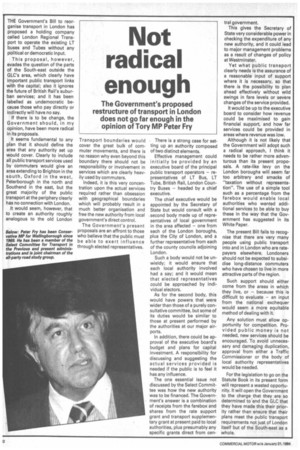Not radical enough
Page 36

If you've noticed an error in this article please click here to report it so we can fix it.
The Government's proposed restructure of transport in London does not go far enough in the opinion of Tory MP Peter Fry
THE Government's Bill to reorganise transport in London has proposed a holding company called London Regional Transport to operate the existing LT buses and Tubes without any political or democratic input.
This proposal, however, evades the question of the parts of the South-east outside the GLC's area, which clearly have important public transport links with the capital; also it ignores the future of British Rail's suburban services; and it has been labelled as undemocratic because those who pay directly or indirectly will have no say.
If there is to be change, the Government should, in my opinion, have been more radical in its proposals.
It seems fundamental to any plan that it should define the area that any authority set up would cover. Clearly to include all public transport services used by commuters would give an area extending to Brighton in the south, Oxford in the west, Peterborough in the north and Southend in the east, but the great majority of the public transport at the periphery clearly has no connection with London.
It would seem, however, that to create an authority roughly analogous to the old London Transport boundaries would cover the great bulk of commuter movements, and there is no reason why even beyond this boundary there should not be responsibility or involvement in services which are clearly heavily used by commuters.
Indeed, it is this very concentration upon the actual services required rather than obsession with geographical boundaries which will probably result in a much better organisation and free the new authority from local government's direct control.
The Government's present proposals are an affront to those who believe that the public must be able to exert influence through elected representatives. There is a strong case for setting up an authority composed of two distinct elements.
Effective management could initially be provided by an executive board of the principal public transport operators — representatives of LT Bus, LT Tube, British Rail, London Country Buses — headed by a chief executive.
The chief executive would be appointed by the Secretary of State but would consult with a second body made up of representatives of local government in the area affected — one from each of the London boroughs, plus the City of London, and a further representative from each of the county councils adjoining London.
Such a body would not be unwieldy; it would ensure that each local authority involved had a say; and it would mean that elected representatives could be approached by individual electors.
As for the second body, this would have powers that were wider than those of a purely consultative committee, but some of its duties would be similar to those at present performed by the authorities at our major airports.
In addition, there could be approval of the executive board's budget and plans for capital investment. A responsibility for discussing and suggesting the actual services provided is needed if the public is to feel it has any influence.
The one essential issue not discussed by the Select Committee was how the new authority was to be financed. The Government's answer is a combination of receipts from the farebox and shares from the rate support grant and transport supplementary grant at present paid to local authorities, plus presumably any specific grants direct from cen tral government.
This gives the Secretary of State very considerable power in checking the expenditure of any new authority, and it could lead to major management problems as a result of changes of policy at Westminster.
Yet what public transport clearly needs is the assurance of a reasonable input of support where it is necessary, so that there is the possibility to plan ahead effectively without wild swings in fare levels or severe changes of the service provided.
It would be up to the executive board to consider how revenue could be maximised to gain financial support, and how far services could be provided in areas where revenue was low.
Although it is not likely that the Government will adopt such a radical approach, I think it needs to be rather more adventurous than its present proposals. A rate-like levy on the London boroughs will seem far too arbitrary and smacks of "taxation without representation". The use of a simple tool such as a percentage from the farebox would enable local authorities who wanted additional services to be able to buy these in the way that the Government has suggested in its White Paper.
The present Bill fails to recognise that there are very many people using public transport into and in London who are ratepayers elsewhere. Londoners should not he expected to subsidise long-distance commuters who have chosen to live in more attractive parts of the region.
Such support should either come from the areas in which they live, or — because this is difficult to evaluate — an input from the national exchequer would seem a more equitable method of dealing with it.
Any solution must allow opportunity for competition. Provided public money is not needed, new services should be encouraged. To avoid unnecessary and damaging duplication, approval from either a Traffic Commissioner or the body of local authority representatives would be needed.
For the legislation to go on the Statute Book in its present form will represent a wasted opportunity. It will open the Government to the charge that they are so determined to end the GLC that they have made this their priority rather than ensure that their plans meet the public transport requirements not just of London itself but of the South-east as a whole.
















































































